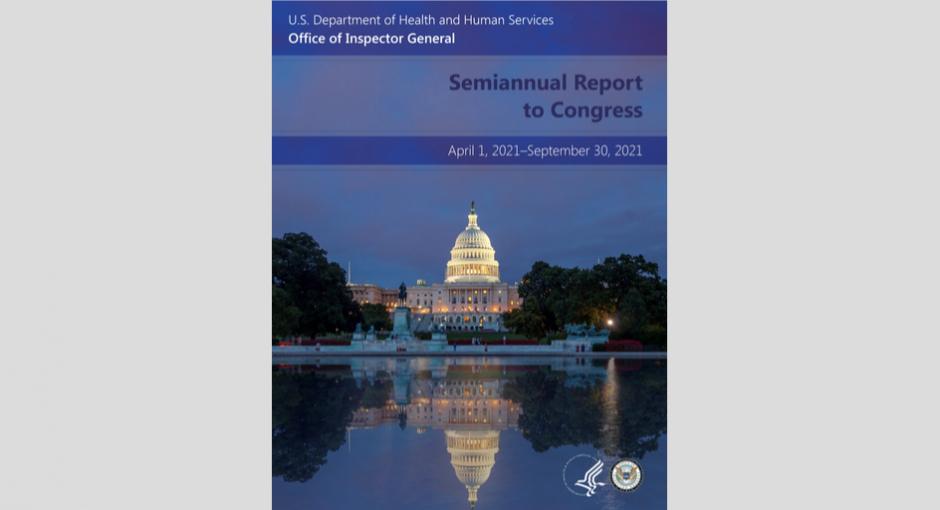The ban on 340B pricing on orphan drugs for over 1,000 hospitals may give companies that make drugs used primarily for common diseases or conditions a strong financial incentive to get an orphan designation for those drugs, a federal watchdog agency recently reminded Congress.
The U.S. Health and Human Services (HHS) Office of Inspector General included that finding, first made in an October report on Medicare spending on orphan drugs, in its latest semiannual report to Congress. OIG delivered the biannual report to lawmakers on Dec. 2.
The October report found that 22 of the 40 drugs that Medicare Parts B and D spend the most on had at least one orphan designation. Nearly all the drugs with an orphan designation each reported total U.S. sales of over $1 billion in 2018, led by AbbVie’s Humira ($13.7 billion), Bristol Myers Squibb’s Revlimid ($6.5 billion), Amgen’s Enbrel ($4.8 billion), Genentech’s Rituxan ($4.5 billion), and Merck’s Keytruda ($4.2 billion).
Fifteen of the 22 drugs with at least one orphan designation also were approved for common diseases or conditions. Of the 15, only one, Rituxan was used more than half the time to treat a rare disease or condition (54% of the time). Enbrel, Gilead’s Harvoni, and Amgen’s Neulasta were used for their orphan indications less than 1% of the time, OIG found.
Congress made critical access hospitals, rural referral centers, sole community hospitals, and free-standing cancer hospitals eligible for 340B drug pricing in 2010. At the same time, it said manufacturers do not have to provide 340B pricing to these hospitals on drugs designated for a rare disease or condition. More than 1,000 rural hospitals are affected. Some drug makers have continued the discounts voluntarily.
Johnson & Johnson recently announced it is ending voluntary 340B discounts to these hospitals on its Janssen brand orphan drugs at the end of this year. Amgen ended voluntary 340B pricing on orphan-designated drugs effective Jan. 1, 2021. (Amgen last week also became the 10th drug company to announce conditions on 340B pricing when contract pharmacies dispense medicines to patients.)
OIG said in its report that “orphan drug exclusion from the 340B Drug Pricing Program may provide an additional financial incentive for manufacturers to seek an orphan designation for
their drugs.”
“For example, fewer than 1 out of 10 Medicare beneficiaries who were prescribed Humira (the best-selling drug in the world) in 2018 received it for an approved orphan indication (i.e., hidradenitis suppurativa or uveitis),” OIG said. “However, because of Humira’s orphan status, the manufacturer would not be required to sell the drug (which costs up to $38,000 per year) to certain covered entities under the 340B Drug Pricing Program at a significant statutory discount—even when it’s being used for common nonorphan indications such as arthritis, psoriasis, or Crohn’s disease.”
“Even further, a drug needs only to be granted an orphan designation to be excluded from the 340B program (i.e., the drug does not need FDA market approval for an orphan indication),” OIG continued. “For example, two of the orphan drugs in our review—Eylea and Orencia—have both been granted at least one orphan designation but had not received FDA marketing approval for any orphan indications in the U.S. at the time of our review. The manufacturers of both drugs are not required to sell their drugs at the 340B discount price to certain covered entities because the drugs have been granted an orphan designation.”
U.S. Reps. Peter Welch (D-Vt.) and David McKinley (R-W.Va.) are the co-sponsors of legislation to modify the 340B orphan drug exclusion. Manufacturers would be required to offer 340B discounts to rural hospitals and free-standing cancer hospitals but only when the orphan drugs are used for common diseases or conditions. Welch with other GOP co-sponsors have failed get the bill passed since 2016.


